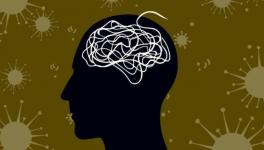Pandemic Blues: Our Memories Can be Affected by Prolonged Negative Mood

Representational image. Image Courtesy: Asianet News Malayalam
What the COVID19 pandemic has exposed us to goes beyond medical and health concerns; it has crept into our minds as well. The overall uncertain situation worldwide, staying away from usual daily life, social distancing and loss of livelihoods—all have accounted for mental health deteriorations.
A study published in Globalization and Health enumerates depression, anxiety and stress as the prominent mental health problems that have emanated out of the pandemic, especially the measures taken in the name of controlling it. The study analysed other studies done in different places and clubbed together the overall result. It says that in a sample size of over 9,000 people (from five other studies), stress is prevalent in approximately 30% of them. Again, in a sample of 63,438 (from 17 studies), anxiety was found to be prevalent in 32% respondents. Similarly, depression was found to be present in 34% people in a sample of over 44,000 (from 14 studies). These analyses show that physical health concerns, hospital, ICU facilities are not the only concerns related to the pandemic. Importantly, the progressing pandemic can affect people from different communities and socio-economic backgrounds differently.
However, the situation can be more concerning and it may not just end up in anxiety, stress and depression. These problems can also impact our memories. Consistent experience of these three conditions can also lead to ‘false memories’, according to Charles Brainerd, a psychologist from Cornell University and one of the leading scientists researching on false memories. He was quoted to have said— “Continuously being in a dark mood makes it difficult to remember the details of your life. Things that substantially elevate people’s stress levels lead to poor encoding of events as we experience them, which in turn elevates false memories.”
Let’s quickly glance through what ‘false memory’ is. Memories, as we perceive in general, appear to be solid and also straightforward. In simple words, memories are the storage of past events in our mind; we store past events as they happened and recall it later. So, when we say we have remembered something, it pertains to the exact event that was experienced. But, researches have shown that memory is much more complicated—it is subject to change and sometimes, becomes unreliable. People may recall a past event in quite a different manner from what has earlier been stored in the mind. These are false memories.
A large research published in Clinical Psychological Science, showed how people with history of stress, anxiety and PTSD (Post-Traumatic Stress Disorder) are at a great risk of producing false memories. This is important not only for clinical aspects, but also from the judicial perspective. In court rooms, testimonies are often based on memories of witnesses. It is imperative to look for whether a witness has experienced trauma, stress, anxiety or has a depression history.
Brainerd and his colleague from Cornell University developed the fuzzy-trace theory of false memory. According to it, there are two types of memories—verbatim and gist. Verbatim memory is the vivid and detailed remembering of past events while gist traces are the fuzzy representation of the past events. False memories, according to the theory, arise when the brain tries to fill up the gaps of a gist memory.
“Fuzzy-trace theory predicts people who experience persistent negative moods are at elevated risk of forming false memories because the memories are distorted to fit a negative take on life. Prolonged levels of high stress from continuing financial, educational, and social uncertainty are a major cause of persistent negative moods. Thanks to the uncertainties of the COVID-19 pandemic, the entire country has been experiencing such prolonged levels of high stress for many months. Worse, those uncertainties have been heightened by the lack of clear federal policies to contain the pandemic,” commented Brainerd about the pandemic’s impact and the policies of his country, the United States.
In this context, an Irish study can be considered. Here, the likelihood of false memories due to fake news about the disease and the virus was studied. In a sample of 3,700 participants, the study finds that people who could assess news themselves were less likely to develop false memories. On the other hand, fabricated news about the pandemic led people who could not judge authenticity of the news themselves to become susceptible to developing false memories. Obviously, the development of false memories also impacts the downstream behaviour.
In conclusion, our memories are not reliable all the time. The arising of false memories is directly related to the environment that we are exposed to--prolong negative environment could lead us to develop false memories and concomitantly, affect our behaviours. The COVID-19 pandemic experience that includes social distancing, uncertainty, anxiety, and depression, can affect our memories.
Get the latest reports & analysis with people's perspective on Protests, movements & deep analytical videos, discussions of the current affairs in your Telegram app. Subscribe to NewsClick's Telegram channel & get Real-Time updates on stories, as they get published on our website.
























